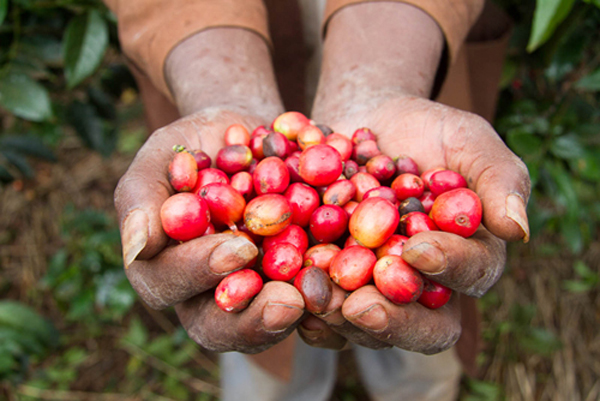The trend of China's coffee industry is to get rid of the situation of pure raw materials.

The trend of China's coffee industry is getting better.
China's coffee industry, represented by Yunnan, has once again encountered fluctuations in the market cycle. The government, enterprises and farmers must join hands to "turn adversity into opportunity" and get rid of the situation of simple raw material producing areas.
Article / Outlook Newsweek reporter
Li Ziliang Ji Zhe Peng
In November, Yunnan Province, China's largest coffee producing area, is about to usher in the harvest season, and farmers in major coffee producing areas such as Pu'er, Dehong, Baoshan and Lincang are actively preparing for harvest. Due to favorable weather conditions, Yunnan coffee is growing well this year.
However, a reporter from Outlook Newsweek found in an interview that in sharp contrast to the bumper coffee harvest, coffee prices, which have been depressed for two years in a row, have made a large number of growers anxious. "what is the exchange rate between the US dollar and RMB?" "what is the futures price of coffee in New York?" At present, hundreds of thousands of coffee growers in Yunnan are most concerned about the topic.
Some industry insiders said that as an international commodity, the global coffee trade is fully market-oriented, the price is highly transparent and fluctuates periodically with the New York coffee futures price. this regular fluctuation also means that prices will usher in a "inflection point" to rebound after falling into the trough.
In spite of this, China's coffee industry is still faced with three major problems: excessively relying on the export of raw materials at parity prices to walk on "one leg", coffee harvesting and initial processing quality to be improved, and market risk resistance mechanism "streaking". The transformation and upgrading of the coffee industry has stood at a crossroads.
Meet again cycle "magic spell"
After years of development, Yunnan has formed major coffee producing areas such as Pu'er, Baoshan, Dehong and Lincang. Statistics show that in 2013, the coffee planting area in Yunnan has exceeded 1.4 million mu, and Yunnan coffee output in the new season is expected to be close to 100000 tons, both of which account for more than 98% of the country's total.
Over the past 20 years, more and more farmers have benefited from growing coffee. However, in the last production season, the purchase price of coffee beans in China continued to decline due to the drag of the international market. In November last year, international coffee companies quoted an opening price of 17.9 yuan per kilogram in Yunnan, a five-year low and approaching the bottom line for coffee growers. But what worries the farmers even more is that the current international coffee price is nearly 40% lower than that of last year.
In this regard, industry insiders said that throughout the past 20 years in Yunnan coffee price trend, almost every 10 years a market cycle. In 2010, the price of coffee in Yunnan reached 41 yuan per kilogram, an all-time high. Coffee prices have been falling ever since.
"Cold Winter" is also an opportunity
When asked whether he would cut down coffee trees and plant other cash crops, the views of Li Kaishun, the village committee of Nandaohe Village, Nanping Town, Simao District, Pu'er City, represented the common views of many farmers.
"Global coffee consumption is growing every year, and in the long run, this is a good time to grow coffee. If there are today's tea, tomorrow's coffee and acquired sugar cane because of price fluctuations, this short-sighted behavior will not yield any benefits. " In the interview, Hute, the agronomy manager of Nestl é in Pu'er, also gave the same view.
Lu Han, director of the coffee office in Pu'er City, also believes that global coffee consumption is on the rise, with growth rates of about 2.5% in traditional markets and 15% to 20% in emerging markets. In emerging markets, Chinese consumption is growing particularly fast, growing at more than 25 per cent a year. Coupled with the unique climatic conditions of growing world-class high-quality small-grain coffee in Yunnan, the trend of continuous improvement of Yunnan coffee industry will not change.
On November 19, in an industrial park in Pu'er City, a 6-acre coffee processing plant is under intense construction, and the steel frame structure of the plant has been erected. "when prices are low, it is beneficial for businesses and processing industries to enter the market, which will reduce the cost of raw materials. At the same time, from the perspective of future demand, I am optimistic about China's coffee industry. " Jin Jihui, chairman of Pu'er 1% Coffee Company, which invested in this processing plant, believes that.
The way for "Big Boss" boutique to break through
Despite the firm confidence of the coffee industry, it still needs to be done in many ways to make China's coffee industry a "big shot" as soon as possible.
At present, China's coffee industry is mainly concentrated in planting and rough processing. There are many coffee processing enterprises and brands in Yunnan, but they are generally small, scattered, weak, backward in technology, short in industrial chain, low in added value, and extremely limited in market recognition and market share. In the face of the rapid development of foreign coffee giants, the local coffee industry urgently needs to get rid of the situation of simple raw material origin.
In addition, in the face of two consecutive years of downturn, many farmers expect the purchase price of coffee to rise, or the government to establish a collection and storage protection mechanism to help growers through the "cold winter."
Peng Yuanguo, member of the standing Committee of the Pu'er Municipal CPC Committee and vice mayor, believes that the price buffer protection mechanism of the world's major coffee producing countries has matured, and the experiences of Colombia, Brazil and Kenya can all be used for reference. In the face of the future domestic and foreign market potential and the advantages of Yunnan coffee resources, it is urgent to establish a buffer mechanism between the international market and domestic coffee producing areas, as well as the industrial link between production resources and market demand.
"Pu'er is considering building a coffee reserve and trading center." Finally, Peng Yuanguo said that when the price of coffee in the international market is lower than the cost price, the government will inject funds to start the reserve mechanism according to the protective price, and the trading center will reasonably determine the income of farmers, set a reasonable storage price, and stabilize the price of coffee market. When the international coffee price is higher than the cost price, the reserve trading center will put coffee on the market according to the expectation of coffee price in the future, so as to ensure the stable income of coffee enterprises and farmers and promote the steady development of China's coffee industry.
Important Notice :
前街咖啡 FrontStreet Coffee has moved to new addredd:
FrontStreet Coffee Address: 315,Donghua East Road,GuangZhou
Tel:020 38364473
- Prev

Cabin coffee Mississippi white-blue tone simple and refreshing style cafe
Cabin Coffee Mississippi
- Next

One cup of freshly brewed coffee a day is effective in protecting the liver, canned coffee and instant coffee are ineffective.
Japanese researchers have found that drinking a cup of freshly brewed coffee a day can improve liver function in patients with chronic hepatitis C, and that the more they drink, the more effective it is to protect the liver. But it should be noted that canned coffee drinks, instant coffee and decaffeinated coffee have no hepatoprotective effect. Researchers at the affiliated Hospital of Osaka City University in Japan have found that drinking more than one cup of freshly brewed coffee a day can improve C.
Related
- Beginners will see the "Coffee pull flower" guide!
- What is the difference between ice blog purified milk and ordinary milk coffee?
- Why is the Philippines the largest producer of crops in Liberia?
- For coffee extraction, should the fine powder be retained?
- How does extracted espresso fill pressed powder? How much strength does it take to press the powder?
- How to make jasmine cold extract coffee? Is the jasmine + latte good?
- Will this little toy really make the coffee taste better? How does Lily Drip affect coffee extraction?
- Will the action of slapping the filter cup also affect coffee extraction?
- What's the difference between powder-to-water ratio and powder-to-liquid ratio?
- What is the Ethiopian local species? What does it have to do with Heirloom native species?

